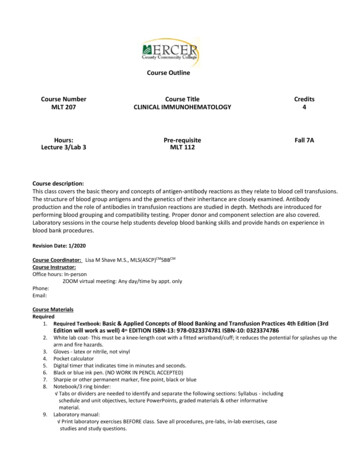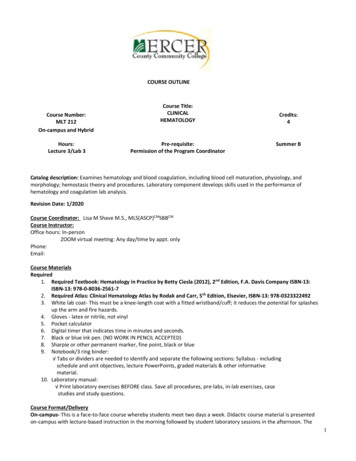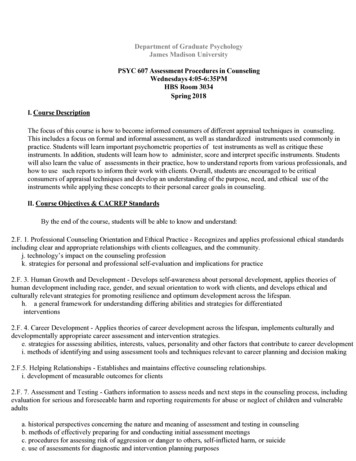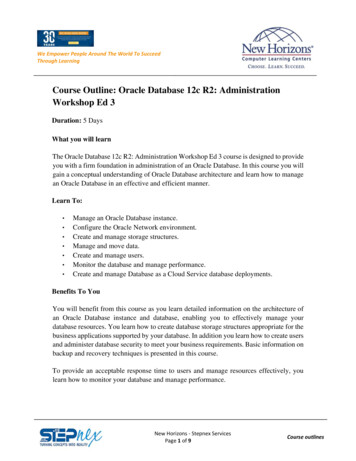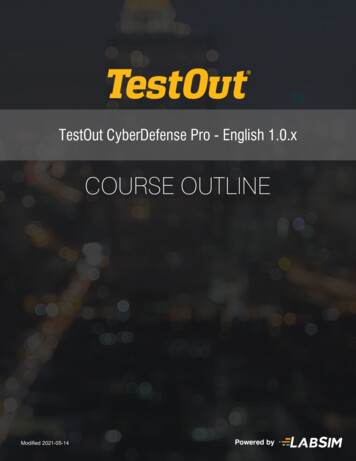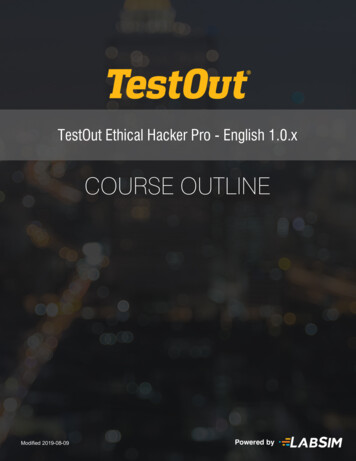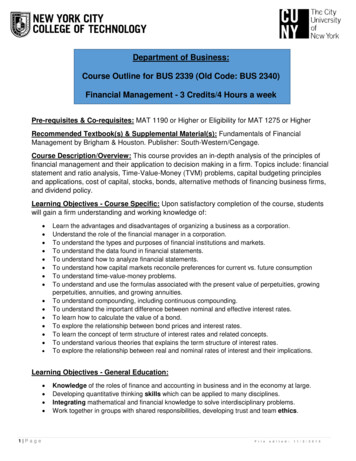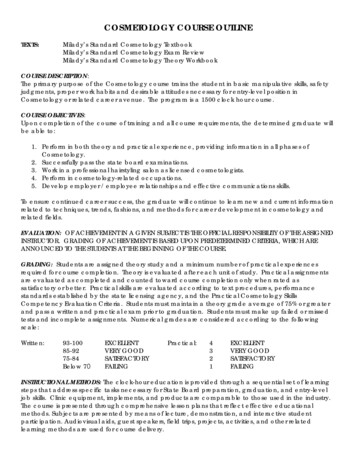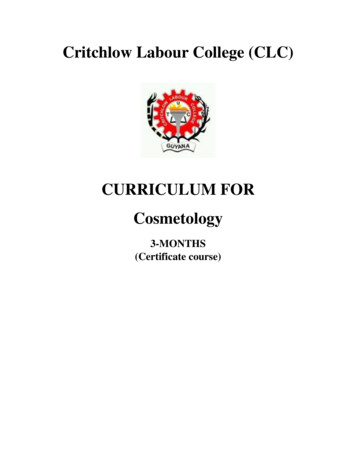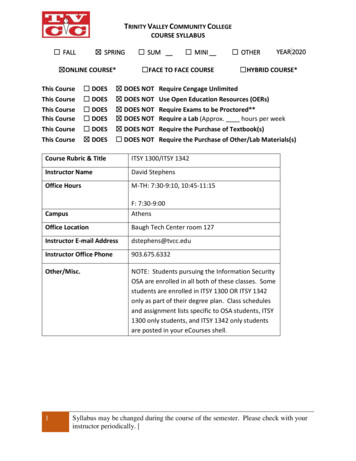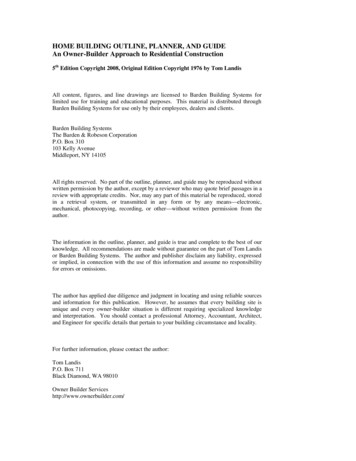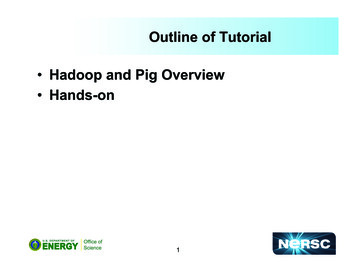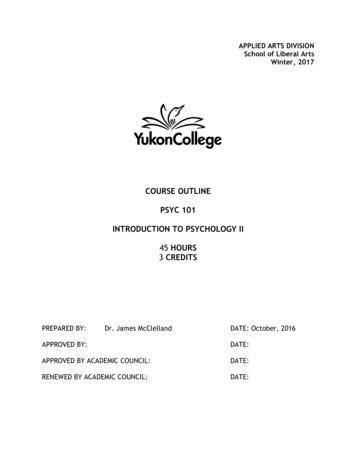
Transcription
APPLIED ARTS DIVISIONSchool of Liberal ArtsWinter, 2017COURSE OUTLINEPSYC 101INTRODUCTION TO PSYCHOLOGY II45 HOURS3 CREDITSPREPARED BY:Dr. James McClellandDATE: October, 2016APPROVED BY:DATE:APPROVED BY ACADEMIC COUNCIL:DATE:RENEWED BY ACADEMIC COUNCIL:DATE:
This work is licensed under the Creative Commons Attribution-NonCommercialShareAlike 4.0 International License. To view a copy of this license, 4.0/.2
APPLIED ARTS DIVISIONPsyc 1013 Credit CourseWinter, 2017INTRODUCTION TO PSYCHOLOGY IIINSTRUCTOR: R. James McClelland, Ph.D.OFFICE HOURS: Monday 10:30 – 12:00OFFICE LOCATION:CLASSROOM:A2911AA2206E-MAIL: jmcclelland@yukoncollege.yk.caTIME: M/W 9:00 – 10:30TELEPHONE: (867) 668-8867DATES: 4 January to 21 AprilCOURSE CALENDAR DESCRIPTIONContinues the survey of all the major content areas of psychology begun in PSYC 100.The course covers development, personality, stress and health, psychopathology,therapy, and social psychology.COURSE DESCRIPTIONIntroductory Psychology 101 is the second half of a survey course of all of the majorcontent areas of Psychology. Both Introductory Psychology 100 and 101 cover basicresearch methodology and current research in the various subject areas, and the basicknowledge and major theories of the field. Introductory Psychology 100 provided anoverview of the following areas of psychology: history of psychology, researchmethods; biological basis of behaviour, sensation and perceptual processes; variationsin consciousness, learning, human memory, and language and thought. This course,Introductory Psychology 101, continues the survey of the field with explorations ofpsychological assessment, motivation and emotions, human development, personalitytheory, stress and health, psychopathology, therapy, and social psychology.PREREQUISITESNone.3
EQUIVALENCY OR TRANSFERABILITYALEX PSYC 101 (3)AU PSYC 290 (3)CAMO PSYC 130 (3)CAPU PSYC 101 (3)KPU PSYC 1200 (3)NIC PSY 131 (3)OC PSYC 121 (3)TRU PSYC 1210 (3)TRU-OL PSYC 1211 (3)TWU PSYC 106 (3)UFV PSYC 102 (3)UNBC PSYC 102 (3)UVIC PSYC 100 B (1.5)VIU PSYC 112 (3)UAF PSYC 102 (3)UAS PSYC 102 (3)UR PSYC 101 (3)SFU PSYC 1xx (3); YUKO PSYC 100 & YUKO PSYC 101 SFU PSYC 100 (3) – B – Soc & SFUPSYC 102 (3) – B SocUBC PSYC 1st (3). YUKO PSYC 100 & YUKO PSYC 101 UBC PSYC 100 (6).UBCO YUKO PSYC 100 & YUKO PSYC 101 UBCO PSYO 111 (3) & UBCO PSYO 121 (3)This information refers to the current course and is taken from the BC Transfer Guide.Please consult bctransferguide.ca for the complete list of transferability that includesolder versions of this course. This course is accepted for transfer by other institutionson a case-by-case basis. For more information about transferability please contactthe Liberal Arts Office.LEARNING OUTCOMESUpon successful completion of the course, students will be able to demonstrate an understanding of basic psychological terminology and explainimportant features of major psychological concepts and theories develop an understanding of basic theories and research methods in psychology critically analyze information about human behavior and distinguish betweenconclusions supported by scientific evidence and conclusions based onnonscientific ways of knowing demonstrate applied psychology research skillsCOURSE FORMAT:The course will consist of lectures, class discussions, debates, demonstrations, andsupplementary audio-visual materials.COURSE REQUIREMENTSStudents are expected to attend regularly, complete all assignments, and toparticipate actively in class discussions. Since a large portion of the examinablematerial will be based on classroom information, attendance is critical. If you miss aclass, please arrange with another student to take notes and to inform you of in-classexperiences. Students are responsible for obtaining handouts and completingassignments for any classes missed. Class discussion is an important element in this4
course. Students will be responsible for the readings assigned and should be preparedto discuss these readings and share their insights in class.All written assignment must be handed in by 1:00 pm on the due date. Should youchoose to do the optional paper, your paper will be due no later than March 22nd.ASSESSMENTSAttendance/Participation15%Regular attendance and in class participation, including the use of i clickers isexpected. Missed classes and non-participation will result in a reduction of the mark.Midterm ExamDue: February 27th30%40% no paperThe mid-term is scheduled for February 27th and will be a multiple choice exam.Academic Paper OptionDue: March 22nd20%You are encouraged to choose to complete a paper if you plan to continue in thesocial sciences and feel comfortable with your writing ability. Should you choose notto do a paper, your final grade will be the combination of the participation, midtermexam, and final exam marks. Should you decide to do the paper, your mark cannotbe less than the combination of the participation, midterm exam, and final exammarks. If the mark on the paper reduces your overall grade point average, it will beexcluded. If the mark on the paper increased your overall grade point average, it willbe included.You should choose a topic that is relevant to the course and if uncertain, approvedbeforehand by the instructor. You are expected to follow the conventions ofgrammar, spelling, and punctuation. Arguments and content should be logical andcoherent, supported by evidence from the literature or primary sources, and shouldalways reference the author of such works. Written assignments should be wordprocessed and double-spaced. You are expected to follow APA writing standards.Your paper will be due no later than March 22nd.Final ExamDue: Exam Week35%45% no paperThe final exam will be comprehensive and take place during the regularly scheduledexam period (April 10 – 21). It will be 3 hours in duration and will contain multiplechoice, short answer, and essay questions. Students must achieve a passing grade of50% on the final examination in order to pass the course. A failed final exam willresult in a failed course.Alternate arrangements will not be made for students unable to write the finalexamination at the scheduled time/date unless exceptional circumstances prevail and5
the instructor has given approval in advance.All evaluative components for this course are compulsory, and must be completed inorder to pass the course.EVALUATIONAttendance/ParticipationMidterm ExamOPTIONAL Academic PaperFinal ExamTotal15%30%40% no paper20%35%45% no paper100%REQUIRED TEXTBOOKS AND MATERIALSWeiten, W., & McCann, D. (2013). Psychology: Themes and Variations, 3rd Edition.Upper Saddle River, NJ: Prentice Hall.Purchase ISBN 0176545484 which provides the textbook, study guide, concept charts,and psyktrek 3.0 multimedia resource.ACADEMIC AND STUDENT CONDUCTInformation on academic standing and student rights and responsibilities can be foundin the Academic ds/Yukon College Academic Regulations and Procedures - August 2013 final v1.pdfPLAGIARISMPlagiarism is a serious academic offence. Plagiarism occurs when students presentthe words of someone else as their own. Plagiarism can be the deliberate use of awhole piece of another person’s writing, but more frequently it occurs whenstudents fail to acknowledge and document sources from which they have takenmaterial. Whenever the words, research or ideas of others are directly quoted orparaphrased, they must be documented according to an accepted manuscriptstyle (e.g., APA, CSE, MLA, etc.). Resubmitting a paper which has previouslyreceived credit is also considered plagiarism. Students who plagiarize material forassignments will receive a mark of zero (F) on the assignment and may fail thecourse. Plagiarism may also result in dismissal from a program of study or theCollege.6
YUKON FIRST NATIONS CORE COMPETENCYYukon College recognizes that a greater understanding and awareness of YukonFirst Nations history, culture and journey towards self-determination will help tobuild positive relationships among all Yukon citizens. As a result, to graduatefrom ANY Yukon College program, you will be required to achieve corecompetency in knowledge of Yukon First Nations. For details, pleasesee www.yukoncollege.yk.ca/yfnccr.ACADEMIC ACCOMMODATIONReasonable accommodations are available for students requiring an academicaccommodation to fully participate in this class. These accommodations areavailable for students with a documented disability, chronic condition or anyother grounds specified in section 8.0 of the Yukon College Academic Regulations(available on the Yukon College website). It is the student’s responsibility to seekthese accommodations. If a student requires an academic accommodation,he/she should contact the Learning Assistance Centre (LAC) at (867) 668-8785 orlassist@yukoncollege.yk.ca.7
TOPIC OUTLINEPSYC 101 – Winter 2017 – SyllabusDr. James McClellandJanuary 4 WELCOME Introductions Course outline and Syllabus Assignments/presentation Use of textbook and supplemental materials Review of Psychology 100 materialJanuary 9 INTELLIGENCE AND PSYCHOLOGICAL TESTING (CHAPTER 9) Key concepts in psychological testing The evolution of intelligence testingJanuary 11 INTELLIGENCE AND PSYCHOLOGICAL TESTING (CHAPTER 9 CONTINUED) Basic questions about intelligence testing Extremes of intelligenceJanuary 16 INTELLIGENCE AND PSYCHOLOGICAL TESTING (CHAPTER 9 CONTINUED) Heredity and environment as determinants of intelligence New directions in the assessment and study of intelligence Putting it in perspectiveJanuary 18 MOTIVATION AND EMOTION (CHAPTER 10) Motivational theories and concepts The motivation of hunger and eating Sexual motivation and behaviourJanuary 23 MOTIVATION AND EMOTION (CHAPTER 10 CONTINUED) Achievement: in search of excellence The elements of emotional experienceJanuary 25 MOTIVATION AND EMOTION (CHAPTER 10 CONTINUED) Theories of emotion Putting it in perspectiveJanuary 30 HUMAN DEVELOPMENT ACROSS THE LIFE SPAN (CHAPTER 11)8
Progress before birth: prenatal development The wondrous years of childhoodFebruary 1 HUMAN DEVELOPMENT (CHAPTER 11 CONTINUED) The transition of adolescence The expanse of adulthood Putting it in perspectiveFebruary 6 PERSONALITY: THEORY, RESEARCH, AND ASSESSMENT (CHAPTER 12) The nature of personalityFebruary 8 PERSONALITY: THEORY, RESEARCH, AND ASSESSMENT (CHAPTER 12 CONTINUED) Psychodynamic perspectives Behavioural perspectivesFebruary 13 PERSONALITY: THEORY, RESEARCH, AND ASSESSMENT (CHAPTER 12 CONTINUED) Humanistic perspectives Biological perspectivesFebruary 15 PERSONALITY: THEORY, RESEARCH, AND ASSESSMENT (CHAPTER 12 CONTINUED) A contemporary empirical approach to personality Culture and personalityFebruary 22 CHAPTER CATCH-UP RECAP AND REVIEW FOR MID TERM TESTFebruary 27 MID TERM EXAMMarch 1 SOCIAL BEHAVIOUR (CHAPTER 13) Person perception: forming impressions of others Attribution processes: explaining behaviour Close relationships: linking and lovingMarch 6 SOCIAL BEHAVIOUR (CHAPTER 13 CONTINUED) Attitudes: making social judgments Conformity and obedience: yielding to othersMarch 8 SOCIAL BEHAVIOUR (CHAPTER 13 CONTINUED) Behaviour in groups: joining with others9
March 13 Social neuroscience Putting it in perspectiveSTRESS, COPING, AND HEALTH (CHAPTER 14) The nature of stress Major types of stress Responding to stress The effects of stress on psychological functioningMarch 15 STRESS, COPING, AND HEALTH (CHAPTER 14 CONTINUED) The effects of stress on physical health Factors moderating the effect of stress Health-impairing behaviour Reaction to illnessMarch 20 PSYCHOLOGICAL DISORDERS (CHAPTER 15) Abnormal behaviour: myths, realities, and controversies Anxiety disordersMarch 22 OPTIONAL PAPER DUE (FINAL DATE FOR ACCEPTANCE MARCH 22ND) PSYCHOLOGICAL DISORDERS (CHAPTER 15 CONTINUED) Somatoform disorders Dissociative disorders Mood disordersMarch 27 PSYCHOLOGICAL DISORDERS (CHAPTER 15 CONTINUED) Schizophrenic disorders Personality disorders Psychological disorders and the law Culture and pathologyMarch 29 TREATMENT OF PSYCHOLOGICAL DISORDERS (CHAPTER 16) The elements of the treatment process Insight therapiesApril 3 TREATMENT OF PSYCHOLOGICAL DISORDERS (CHAPTER 16 CONTINUED) Behaviour therapies Biomedical therapies10
April 5 TREATMENT OF PSYCHOLOGICAL DISORDERS (CHAPTER 16 CONTINUED) Current trends and issues in treatment Institutional treatment in transition Putting it in perspective QUESTIONS, REVIEW FOR FINAL EXAMApril 10–21 EXAM PERIOD PSYC 101 Exam Date and Time TBA11
Continues the survey of all the major content areas of psychology begun in PSYC 100. The course covers development, personality, stress and health, psychopathology, therapy, and social psychology. COURSE DESCRIPTION Introductory Psychology 101 is the second half of a survey course of all of the major content areas of Psychology. Both Introductory Psychology 100 and 101 cover basic research .
